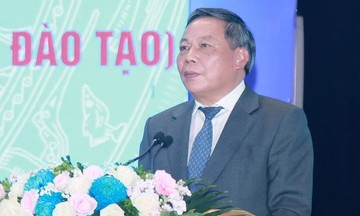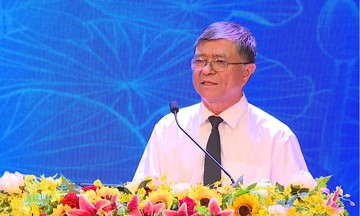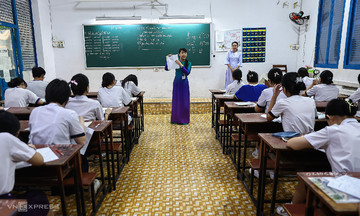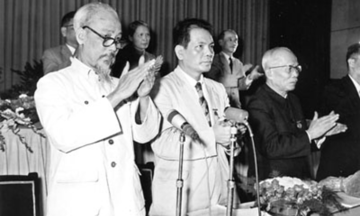This observation emerged during the livestream "Confidently entering the AI era - starting with your chosen field of study" hosted by FPT University (FPTU) on 8/7, as part of the "Prompt Your Future" series. The program featured two speakers, both FPTU alumni: Le Binh Trung, director of Admissions at FPTU, and Nguyen Duc Minh Quan, deputy head of Digital Transformation at FPT Retail.
The discussion provided information about the impact of AI on the labor market and university admissions, while also offering guidance to students born in 2007 who are facing the important decision of choosing a major and university.
The rapid development of artificial intelligence is changing how people work. Therefore, the appeal of a field of study no longer depends entirely on market trends, but rather on the ability to apply technology, especially AI.
Nguyen Duc Minh Quan shared that in the digital age, any profession can become a "hotspot" if learners know how to leverage technology to increase productivity. AI won't replace people, only those who don't know how to use it.
"I use AI every day to process reports, summarize meeting content, or create presentation slides. Thanks to AI, I save time on repetitive tasks and can focus on highly specialized work," he said.
 |
Nguyen Duc Minh Quan and Le Binh Trung (from left to right) at the online meeting. Photo: FPTU |
Nguyen Duc Minh Quan and Le Binh Trung (from left to right) at the online meeting. Photo: FPTU
According to Quan, asking the question "How can AI help me with this task?" has become a professional reflex, part of an "AI-first" mindset. Workers who know how to operate, control, and provide effective feedback to AI will have a significant advantage in today's competitive environment.
Sharing the same view, Le Binh Trung affirmed that the AI era is similar to previous industrial revolutions. Those who don't keep up will be left behind. This technology creates great inspiration and has many applications, creating two scenarios: obstacles and challenges if not kept up with, but if mastered, workers can be pioneers and contribute to building a knowledge economy.
"Students born in 2007 are a golden and very important generation. They are the main force in the nation's rising era. Consider this an opportunity to engage, learn, and master technology," he emphasized.
24 majors integrating AI
With an "AI-first" orientation, FPTU is implementing a training program that deeply integrates technology into 24 majors, helping students develop both their professional expertise and technological capabilities.
According to Le Binh Trung, the "AI-first" orientation is not just about incorporating AI applications into the curriculum but is a philosophy that permeates management, teaching, and learning. Educators must use AI first to understand the tool, and from there, they can choose the appropriate approach and guide students to use it effectively in each major.
Since 2006, FPT has clearly defined that "technology is no longer the exclusive domain of the IT industry" but a pervasive platform in all fields. Before the AI boom, FPTU proactively integrated technology into at least 20% of the general knowledge content of all training programs, from Information Technology, Business, Communications to even seemingly unrelated fields like Logistics or Design.
"When designing digital art, FPTU students learn VR and AR. When studying tourism, they approach virtual tourism using panorama technology. When ChatGPT appeared, we immediately analyzed and updated the curriculum to ensure students are not left behind," Trung shared.
 |
FPTU students studying on campus. Photo: FPTU |
FPTU students studying on campus. Photo: FPTU
Beyond theory, the "AI-first" mindset is integrated into the orientation week (Orientation Week). Students are guided to set up personal learning assistants using ChatGPT, learn about the ethics of using AI, and are introduced to two important AI tools to serve their learning process throughout four years.
The director of Admissions at FPTU also highlighted three advantages of FPTU’s training model. First is the practical internship at businesses starting from the 6th semester. Students experience the real working environment right from their third year through the On-the-Job Training (OJT) program at large enterprises. This is the stage to apply learned knowledge into practice, hone professional skills, and enhance adaptability to the labor market.
Second, FPTU applies the "sandwich" model, training interspersed between theoretical learning and practical business experience, helping students stay updated with industry practices and trends. In addition, the university implements interdisciplinary projects originating from real business needs, helping students from various majors collaborate to solve real-world problems, fostering applied thinking and the ability to work across multiple fields.
Finally, the university focuses on equipping students with self-learning and lifelong learning skills. In the digital age, self-learning ability is the key to competition. FPTU provides students with the skills and tools to help them update new knowledge from over 300 universities and corporations globally.
Nhat Le
FPT University Code: FPT
Major Codes of 24 specializations:
- Information Technology (7480201): Information Security, Digital Automotive Technology, Software Engineering, Digital Transformation, Digital Art Design, Semiconductor Chip Design, Artificial Intelligence
- Business Administration (7340101): Financial Technology (Fintech), Digital Marketing, International Business, Logistics and Global Supply Chain Management, Hotel Management, Tourism & Travel Service Management, Corporate Finance, Digital Banking - Finance, Investment Finance
- Media Technology (7320106): Public Relations, Multimedia Communications
- Languages: English (7220201), Chinese-English (7220204), Korean-English (7220210), Japanese-English (7220209)
- Law (7380101): Economic Law, International Trade Law












